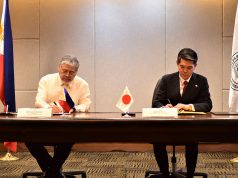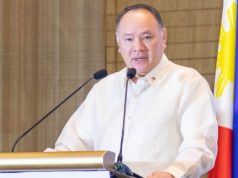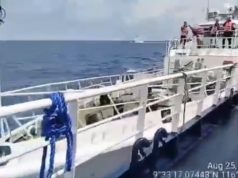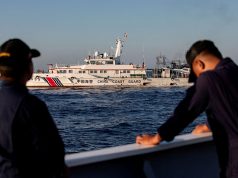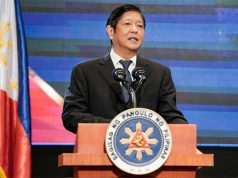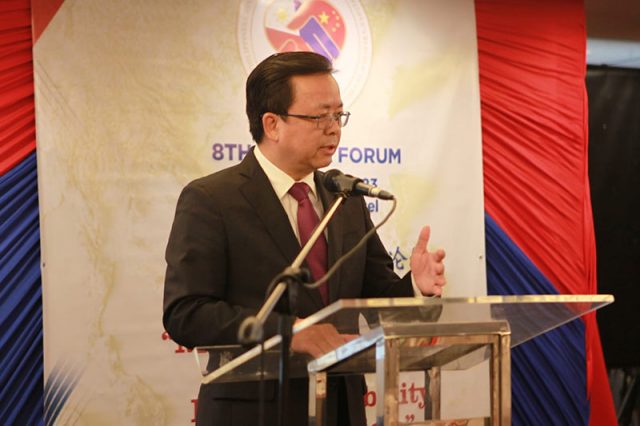
Was the Chinese ambassador to the Philippines really “misquoted” when he told Manila to oppose “Taiwan’s independence” if it “genuinely” cares about the thousands of overseas Filipino workers in Taiwan?
This was what the Chinese Embassy in Manila said in response to comments that Chinese Ambassador Huang Xilian made a “threat” in his speech at the 8th Manila Forum of the Association for Philippine-China Understanding on April 14.
The Chinese envoy previously blasted the United States’ expanded access to Philippine military bases through the Enhanced Defense Cooperation Agreement (EDCA), perceiving it to “interfere in the situation across the Taiwan Strait” and “advance its anti-China agenda.”
China is not a party to the bilateral agreement, which defense department officer-in-charge Carlito Galvez said was meant to enhance the Philippines’ ability to defend itself against external threats.
Huang also made a reference to the thousands of OFWs in Taiwan. A transcript of his speech reads:
Some tried to find excuse for the new EDCA sites by citing the safety of the 150,000 OFWs in Taiwan, while China is the last country that wishes to see conflict over the Strait because people on both sides are Chinese.
But we will not renounce the use of force, and we reserve the option of taking all necessary measures. This is to guard against external interference and all separatist activities.
The Philippines is advised to unequivocally oppose ‘Taiwan independence’ rather than stoking the fire by offering the US access to the military bases near the Taiwan Strait if you care genuinely about the 150,000 OFWs.
Huang’s comments have prompted reactions from the Department of National Defense and National Security Council, with both saying that the Philippines was not meddling with China’s affairs with Taiwan.
The NSC also said it takes “grave exception to any effort by guests in our country to use this to fear-monger and intimidate us.”
Opposition Sen. Risa Hontiveros found the Chinese envoy’s remarks alarming and urged the Palace to recall Huang if “he is unable to engage with us in a respectful and dignified manner.”
Migrante International, a global coalition of OFW groups and their families, had similar reactions.
The group argued that Huang “makes it appear that China is holding OFWs in Taiwan hostage.”
The group also said Beijing should start ceasing its aggressive actions against Manila in the West Philippine Sea if it was really against the American troops’ presence in the archipelagic state.
Meanwhile, in response to comments against Huang’s remarks about the 150,000 Filipino workers in Taiwan, the Chinese Embassy in Manila said its ambassador was “misquoted or misinterpreted.”
“It is appreciated that there was extensive coverage on Ambassador Huang Xilian’s speech at the 8th Manila Forum,” the embassy said on April 16.
“Unfortunately, some misquoted or misinterpreted Ambassador Huang’s remarks or simply took part of the [Ambassador’s] words out of context. In order to set the record straight, the following is the original text of the speech,” it added, giving website links to Huang’s transcript.
‘No misquotation’
Some Filipinos were not too convinced by the embassy’s response, perceiving that the “threat” was in the transcript provided.
“Not misquoted if the threat was actually in the transcript (para 8) of the speech,” ABS-CBN weather meteorologist Ariel Rojas tweeted, adding a screengrab of the specific paragraph he mentioned.
Another Twitter user commented that there was “no misquotation.”
“It’s clear what they meant when they said that. The Chinese Ambassador just tries to spin things around and try to make himself victim, when it’s clear he is bullying us,” he tweeted.
“No. The words used are as simple as what they meant. No misquotation happened!” wrote a different Pinoy in response to the Chinese Embassy’s statement.
Maritime law professor Jay Batongbacal also said that the threat was “accurately reflected in the transcript.”
“Out of context? If anything, what the transcript shows is that it was unnecessary, and cannot be taken as anything other than an unwarranted direction coupled with a threat of consequences,” he tweeted.
To misquote is an “act of or instance of quoting something incorrectly,” according to Merriam-Webster.
To misinterpret, on the other hand, is defined as “to explain wrongly” or “to understand wrongly.”
To “take out of context,” meanwhile, means that “only a small separate part of what was originally said or written is reported, with the result that their meaning is not clear or is not understood.”
Part of Huang’s provided transcript reads:
The Philippines is advised to unequivocally oppose ‘Taiwan independence’ rather than stoking the fire by offering the US access to the military bases near the Taiwan Strait if you care genuinely about the 150,000 OFWs.
“Threat” is defined as “an expression of intention to inflict evil, injury, or damage.”
It also means “an indication of something impending.”
A retired general previously interpreted Huang’s comments on the Taiwan OFWs as a “veiled threat.”
“It is a veiled threat… ‘Huwag niyo payagan ang EDCA bases’’.. Threat nga ‘yun. Pakikialam ‘yun sa ating sovereignty,” Retired Gen. Edilberto Adan said in a media forum on April 15.
Political analyst Renato Cruz de Castro also said that he fails to see the “connection” of the situation of Taiwan OFWs to the EDCA sites.
For de Castro, a possible risk for them would be if China launched a major military offensive on the self-governing island. This is when the additional military bases could be used for evacuation.
“I hope he is not referring to that, because that is already an indication of something that China might do probably in the next four years,” he said of Huang’s comments.
Sen. Francis Tolentino, vice chair of the Senate foreign relations panel, suggested that the “Balikatan” exercises should include drills on evacuating Filipinos in Taiwan in case tensions between Bejing and the self-ruling island increase.
China considers Taiwan part of its territory under its “One China Policy” which claims that there is only one Chinese government. It also regards the self-governing island as a breakaway province.
Taiwan elects its own president and has national and foreign policies separate from China.




